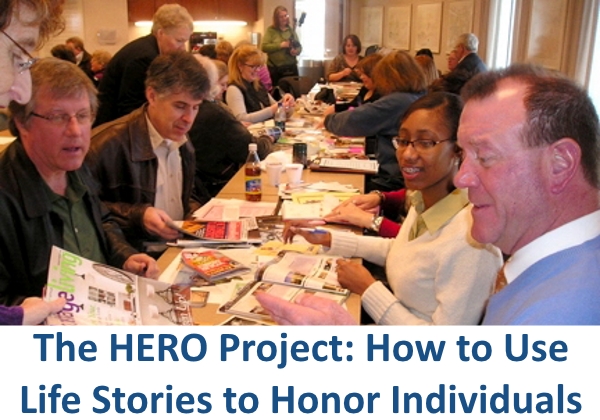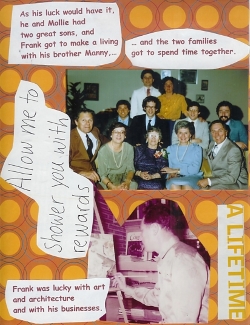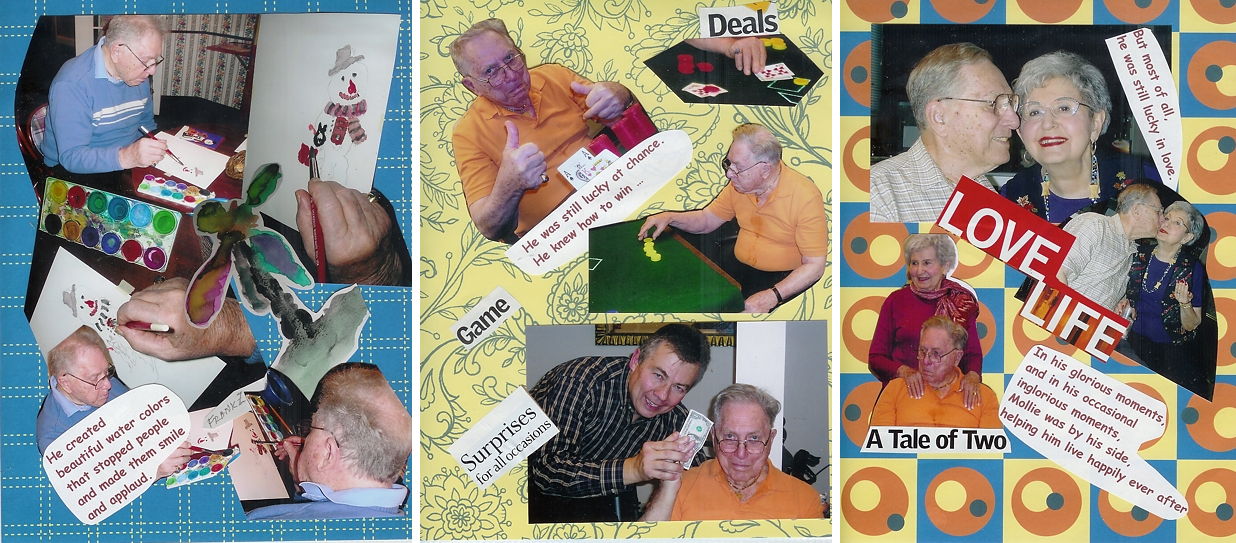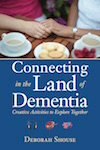Contributing Writer: Deborah Shouse, writer, speaker, editor, former family caregiver, and dementia advocate

When my partner’s father Frank moved into assisted living, we wanted to do something to honor and celebrate him. We also wanted a project that would engage all of us, including Frank’s worried wife Mollie.
With Frank’s blessing, we created a mini-life story based on the theme, Lucky Frank. My partner Ron, Mollie, Frank, and I sat around a table, scrapbooking the story with family photos, magazine pictures, and inspiring quotes, and talking about old times.
We called this simple colorful scrapbooked story The HERO Project, because we were documenting Frank as the hero he was. We shared the finished product with family, friends, and staff.
Using HERO Stories to Connect
When Frank moved from assisted living into a memory care community, we used Lucky Frank to introduce him, so the staff could really get to know Frank as a person. We copied parts of the book to grace the memory box outside of Frank’s room.
The book stayed in Frank’s room and we often used it to jump-start a visit, reading it aloud, with Frank often reading along. We also used it during a visit, as a conversation catalyst.
This simple book gave us all, particularly Frank, a lot of pleasure.
Writing a HERO Story
To get started writing a HERO story, look for qualities, key life moments, hobbies, special relationships, family lore, and preferences to anchor the story. For Frank, luck was a quality that spanned his life and was evident both before and during his time living with dementia.
As you write out the story, look for a meaning you want to share. (If a meaning doesn’t appear, don’t worry. The story will still be great.) Lucky Frank is short, only a couple of hundred words spread across ten scrapbooked pages. But it’s powerful life review with the message: “Love transcends everything.”
Have fun! Add a playful flair with a dramatic, fairy tale opening such as, “Once upon a time…” Or, “In a galaxy far far away.” Or, “In a galaxy just down the street.”
We started Lucky Frank like this:
“Once upon a time, there was a man named Frank. Frank, felicitously, was born lucky. When he was in his twenties, he was lucky enough to meet Mollie AND he was smart enough to marry her.”
 We continued, mentioning family, work, vacations, his talent with creating art, his amazing luck at playing cards and winning, and more. For us, it was important to acknowledge his dementia and the gifts it brought. Towards the end of the story, we wrote this:
We continued, mentioning family, work, vacations, his talent with creating art, his amazing luck at playing cards and winning, and more. For us, it was important to acknowledge his dementia and the gifts it brought. Towards the end of the story, we wrote this:
“As Frank grew older, he was no longer quite so lucky in remembering all his adventures, talents, and successes, but he was still lucky in continuing to have adventures, talents, and successes.” And he was still lucky with his art, perhaps even luckier.
We showed pictures of the brilliant watercolors Frank was currently painting and photos of him winning at cards and having fun, even when he didn’t win. We ended our story by saying, “But most of all, Frank was still lucky in love, with Mollie by his side, helping him live Happily Ever After.”

Benefiting from the HERO Experience
We created many HERO projects for individuals and for groups and enjoyed every one of them. They were engaging, meaningful, and they allowed us to appreciate and feel gratitude for our HEROes. The benefits include:
• Engaging everyone, including people who are living with dementia, in an easy, hands-on creative activity
• Capturing part of the life story
• Creating a booklet that offers an appreciative and visual overview of the HERO and that offers a wonderful way to connect with staff, friends, family, out-of-town relatives, and more
• Using the book as a conversation catalyst and an affirmation of the HERO’s life and accomplishments
For more HERO ideas, please visit TheCreativityConnection.com and click on HERO Project.
 About the Author: Deborah Shouse is a writer, speaker, editor, former family caregiver, and dementia advocate.
About the Author: Deborah Shouse is a writer, speaker, editor, former family caregiver, and dementia advocate.
Deborah’s latest book, Connecting in the Land of Dementia: Creative Activities to Explore Together, features dozens of experts in the field of creativity and dementia. These innovators share ideas that engage the creative spirit so you can continue to experience meaningful moments of connecting.
Her earlier book, Love in the Land of Dementia: Finding Hope in the Caregiver’s Journey, invites readers to embrace the gifts and blessings in the experience.
You can purchase her books through the Together in This Amazing Store
(pricing and shipping fulfilled by Amazon)
To learn more, about Deborah and her work, visit DementiaJourney.org
If you like what you’ve read, why not receive periodic updates when you:
Subscribe to the TinT Newsletter
Have you done anything similar or have thoughts or questions? We’d love to hear from you in the comments below:







Hey, Deborah! Thanks for the great work you are doing for seniors and their families. My ghostwriting company Cider Spoon Stories (www.ciderspoonstories.com) offers something very similar: we help seniors write their life stories for the grandkids! It’s such fulfilling work, as you know. 🙂 We also published a workbook last year called Notes From a Distinguished Life that teaches kids to interview their grandparents or other loved ones. In case you want to check it out: http://www.ciderspoonstories.com/guide. Keep it up! –Jess
Thank you for you comment and for sharing your wonderful resource.